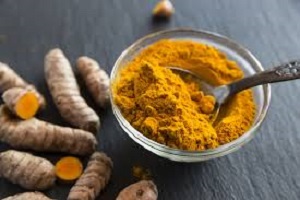10 Side Effects of Turmeric ~ Can Too Much Be Negative?
10 Side Effects of Turmeric ~ Can Too Much Be Negative?

The popular spice turmeric is derived from the root of the Curcuma longa plant. It has a substance called curcumin, which could lessen swelling.
Curry powders, mustards, butter, and cheeses are typically flavored or colored with turmeric, which has a warm, bitter taste.
Turmeric is frequently used to treat diseases that involve pain and inflammation because curcumin and other substances in it may reduce swelling.
Turmeric is also used by people with osteoarthritis. It is also used to treat hay fever, depression, high cholesterol, a certain type of liver illness, and itching, but the majority of these applications lack strong scientific backing.
Major Points
- Consuming large amounts of turmeric may result in extremely low blood pressure, gallbladder problems, digestive problems, an increased risk of excessive bleeding, and male infertility.
- Consume it in moderation to minimize any harmful effects.
Turmeric Side Effects
Though lately regarded as a superfood, did you realize that turmeric has some severe negative effects?
Of course, this refers to consuming huge quantities of turmeric as a supplement rather than occasionally using it in cooking, which is typically regarded as entirely safe (and delicious!)
Constituents of Turmeric ~ Ingredients in turmeric
The plant that provides turmeric sometimes referred to as Indian saffron or the golden spice, is a native of Asia and Central America.
The primary component of turmeric constitutes of natural antioxidants, which are given as.
- Volatile oil
- Turmerone
- Curcuminoids
- Curcumin demethoxycurcumin
- 5′-methoxy curcumin
- Dihydrocurcumin
Did you know? The Vedic civilization has used turmeric for approximately 4,000 years. Although it originated in India, by the year 700 A.D., it was also being grown in China, East Africa, and West Africa by the year 800 A.D.
In other words, whether you add turmeric (and curcumin on its own) to food or take it as a supplement, it may be a worthwhile addition to any healthy diet
Let’s examine some potential side effects that turmeric may have:
Ten possible side effects of taking too much turmeric are listed below:
- Turmeric Might Make Acid Reflux Worse
Turmeric’s anti-inflammatory qualities may contribute to gas and bloating in some individuals who experience mild stomach distress after eating it.
Due to its blood-thinning properties, turmeric may also interact negatively with some drugs.
- It could result in indigestion and stomach upset.
The effects of turmeric may include diarrhea, nausea, and upset stomach. It may also trigger an allergic reaction in certain persons.
Reduce your intake of turmeric or stop using turmeric supplements if you experience any of these negative effects. Better still, consult with your doctor
- Could Boost the Chance of Kidney Stones
The active component of turmeric, curcumin, may increase the quantity of oxalate in the urine, a risk factor for kidney stone development.
- Could Reduce Blood Sugar Levels
Curcumin and turmeric may lower blood sugar levels, which could reduce the effectiveness of diabetes treatments.
Make sure to keep a close eye on your blood sugar levels if you have diabetes and use or intend to use turmeric supplements
- High Doses, May Damage Liver
If consumed in high dosages, people who already have liver issues may experience worse side effects.
- Might conflict with medications that slow blood clotting
Turmeric contains a compound called curcumin, which can thin the blood and may interact with drugs that prevent blood clots.
It is advised to cease taking supplements containing curcumin or turmeric at least two weeks before surgery.
- Low Blood Pressure
If you already take blood thinners or medications to control your blood pressure, it is best to stay away from turmeric.
If you already have low blood pressure, it may result in a significant decline in your blood pressure, which could be harmful.
- Enhanced Bleeding Risk
The active component of turmeric, curcumin, may make bleeding more likely.
Patients with bleeding disorders or those taking medications that could raise the risk of bleeding should use curcumin with caution. It could be required to modify the dosage.
Due to its anticoagulant properties, turmeric may raise the chance of bleeding both during and after surgery.
Turmeric usage needs to be stopped at least two weeks before surgery since it increases the chance of bleeding.
- It may occasionally result in skin irritation or allergies.
Curcumin, an active substance found in turmeric, may be the cause of the spice’s skin-brightening properties.
It contains some volatile oils that, in some situations, can irritate the skin or trigger allergies.
So, before applying turmeric to the skin, it’s crucial to perform a patch test.
- Pregnant and nursing women may not be able to use it safely.
Although research has indicated that turmeric is generally regarded as a healthy supplement, it may not be safe for women who are pregnant or nursing.
Women who are pregnant or nursing should stay away from turmeric. Because it accelerates menstrual flow, turmeric may increase the risk of bleeding, and some people worry that this could harm or even stop a pregnancy.
However, turmeric is regarded to be safe to use while pregnant when used in the quantities found in most foods.
What Daily Amount of Turmeric Powder Should You Take? How much turmeric can you safely eat?
Turmeric is not just another spice. It is a herb that has been used for countless years in traditional Chinese and Indian medicine because it possesses anti-inflammatory, antibacterial, and antioxidant properties.
You should use turmeric with extreme caution because it is a very effective natural treatment, especially if you have other medical concerns or are taking prescription medication.
Turmeric (curcumin) should not be taken more than 1200 mg per day. Although it has no adverse effects, you shouldn’t use it if you’re expecting or breastfeeding.
You should consume no more than 6 teaspoonfuls of turmeric powder each day because each teaspoon of turmeric contains 200 milligrams of curcumin.
Who should not take turmeric?
Numerous active alkaloids are present in turmeric.
A blood-thinning effect from high doses of turmeric may occur when combined with prescribed anticoagulants.
Therefore, it should either be avoided or used with caution by those who have the following conditions.
- Bleeding disorder: Turmeric should not be taken by anyone who uses injectable blood thinners.
- Diabetes: Turmeric curcumin may help diabetic people with their blood sugar levels. Doctors, therefore, advise diabetics to be cautious or to refrain from taking turmeric.
- Gallbladder issues: People who have gallstones or bile duct obstruction shouldn’t take turmeric supplements.
- Gastroesophageal reflux disease (GERD): Turmeric can make conditions like GERD worse. GERD sufferers should keep an eye on their symptoms to see whether they worsen while taking turmeric.
- Turmeric use by men may result in infertility.
- Iron deficiency: A high turmeric intake may interfere with the body’s ability to absorb iron.
- Liver illness: Turmeric can harm the liver, particularly in those who already have the disease.
- Hormone-sensitive diseases like breast cancer, uterine cancer, ovarian cancer, endometriosis, or uterine fibroids: Studies have shown that the turmeric compound curcumin may mimic the effects of the hormone estrogen.
- Heart arrhythmia: A man is said to have ingested 1,500 grams of turmeric in a single day before passing away from an irregular heartbeat.
- Pregnancy: Due to its uterine-stimulating properties, turmeric may cause menstruation in pregnant people.
Is daily turmeric consumption safe? What occurs to your body if you consume turmeric regularly?
When administered orally: Short-term use of turmeric is probably safe.
When taken for up to two months, turmeric products that contain up to 8 grams of curcumin per day appear to be safe.
Additionally, it appears safe to consume up to 3 grams of turmeric every day for up to 3 months.
Summary
Turmeric’s health benefits are numerous, so its drawbacks are rarely highlighted. Internal consumption of turmeric, however, may exacerbate acid reflux issues and cause gallbladder contractions.
Turmeric overuse may also increase your risk of bleeding, kidney stones, infertility, and iron deficiency.
So, consume it moderately to avoid its bad effects. In addition, you might seek the advice of a nutritionist to develop a diet plan that emphasizes eating in moderation.
FAQs
What are the risks associated with turmeric?
In food, turmeric is regarded as safe. On the other hand, ingesting significant doses of turmeric and curcumin over an extended period may result in stomach discomfort and, in severe cases, ulcers.
Before consuming turmeric, patients with gallstones or bile duct obstruction should consult their doctor.
Which medicines ought to be avoided when taking turmeric?
Taking supplements containing turmeric may increase your risk of developing kidney stones.
If you are using aspirin, ibuprofen (Advil, Motrin), or acetaminophen (Tylenol), you should avoid taking turmeric pills. Turmeric may lessen the effects of these medications.
What occurs to your body if you consume turmeric every day?
Numerous health benefits of turmeric have been scientifically demonstrated, including the ability to protect against Alzheimer’s disease and cancer.
Its most active component, curcumin, also has the potential to boost heart health. It works well as an antioxidant and anti-inflammatory.
Additionally, it might lessen arthritis and depression symptoms.
Can turmeric harm internal organs? Is turmeric safe for the kidneys and the liver?
The primary bioactive component of turmeric, curcumin, is a potent antioxidant with anti-inflammatory qualities.
Even while turmeric and curcumin are typically safe to eat, too much of a good thing can be dangerous.
The possibility that high doses could harm your kidneys is one of the hazards.
The Potential Side Effects of Turmeric and Curcumin
The Risks Associated with Turmeric and Curcumin
Turmeric may inhibit the absorption of iron; it may interact with blood thinners; it may excessively lower blood sugar; it may cause kidney stones; it may also cause nausea, diarrhea, and headaches.
What happens if you consume warm turmeric water on an empty stomach every morning for seven days?
1) Regularly consuming lukewarm water combined with turmeric powder in the morning helps to boost mental alertness and activity.
2) Consuming turmeric-infused water regularly helps keep blood-related health conditions under control by removing pollutants from the blood.
Additionally, it guards against heart attacks.
How long does turmeric stay in your system?
Turmeric powder stays in your body for a long time because it is a fat-soluble nutrient.
While most of the turmeric powder you eat will be excreted from your body within 24 hours, a little amount of this material will accumulate in your liver and other fatty tissues.
8 Benefits of Turmeric
- Turmeric Soothes Digestion
- Turmeric Amps Up Fat Burning
- Enhances Immune Function
- Improves Skin Complexion
- Turmeric Supports Strong Bones
- Turmeric for Joint Mobility and Stiffness
- Promotes Healthy Blood Pressure Levels
- Curcumin Improves Circulation Health
How to take turmeric for inflammation
Three parts of raw honey and one part of turmeric powder are combined.
Eat a teaspoon of the combination every two hours to improve immunity and reduce inflammation when you start to feel a cold coming on.
How much turmeric should I take daily for inflammation?
500 to 1,000 mg of curcumin per day is required to have the anti-inflammatory effect.
Around 200 milligrams of curcumin are included in one fresh teaspoon of ground turmeric.
Depending on the place of origin and the source, the amount varies a little.
How to take turmeric
Turmeric powder is a food additive. It frequently appears in recipes such as roast beef, soups, and curries.
The heated beverage known as “golden milk” is one of the oldest methods to consume it.
Despite being delicious, turmeric is not easily absorbed by the body through food.
Turmeric benefits for women ~ 7 Benefits of turmeric for women
- It’s an anti-inflammatory. Turmeric is commonly used to fight inflammation
- Promotes skin health
- It may alleviate arthritis symptom
- It can cause skin wounds to heal faster
- May prevent heart disease
- It may prevent depression
- Can be used as an anti-aging supplement.
Cardiac side effects of turmeric
Although turmeric rarely has serious negative effects, some people may develop diarrhea, nausea, or stomach trouble.
According to one case, a person who consumed over 1500 mg of turmeric twice daily developed a risky irregular cardiac rhythm.
Turmeric side effects on the face
Although using turmeric topically and orally is generally harmless, there is a chance of developing contact dermatitis.
However, the following signs and symptoms of contact dermatitis include burning, itching, stinging, and soreness. Inflammation and flushed skin.
Turmeric side effects NHS
Evidence
- Nausea
- Flatulence
- Diarrhea
- Dyspepsia
- Abdominal distension.
- Constipation
Most serious side effects of aspirin
Side Effects
- Firstly, abdominal or stomach pain, cramping, or burning.
- Secondly, convulsions, severe or continuing.
- Decreased frequency or amount of urine.
- Bloody or cloudy urine.
- Change in consciousness.
- Chest pain or discomfort



